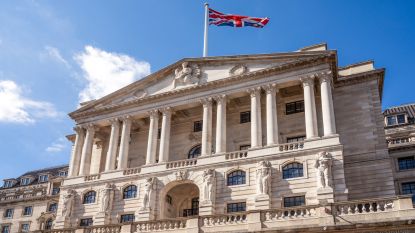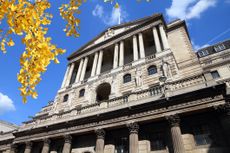When will interest rates fall?
The Bank of England has hiked interest rates to a fresh 15-year high of 5.25%, but could the end of the hiking cycle be in sight?


The Bank of England has raised its base rate to a fresh 15-year high as it continues to battle inflation, despite the pain it's causing for mortgage holders and fears it might be slowing down the economy.
The Monetary Policy Committee (MPC) has pushed its base rate 0.25 percentage points higher to 5.25%, its highest level since February 2008.
The move shows the Bank continues to fight inflation, which dropped to 7.9% in June – four times over its target of 2%.
Subscribe to MoneyWeek
Subscribe to MoneyWeek today and get your first six magazine issues absolutely FREE

Sign up to Money Morning
Don't miss the latest investment and personal finances news, market analysis, plus money-saving tips with our free twice-daily newsletter
Don't miss the latest investment and personal finances news, market analysis, plus money-saving tips with our free twice-daily newsletter
The decision follows moves by both the US Federal Reserve and the European Central Bank, which hiked their base rates by a quarter of a percentage point last week.
But how much will interest rates rise by, and what does another interest rate hike mean for your finances?
Will interest rates rise again in 2023?
The debate isn't whether policymakers will hike rates or not, but by how much, according to analysts.
Economic forecasting group EY Item Club expects interest rates will peak at 5.5%, adding it doesn’t expect them to fall until the second half of next year.
The group also predicts economic growth will fall in 2024 due to the delayed impact of rate hikes on the economy.
Other traders reckon two more rate rises are in the pipeline and that they will peak at 5.75%.
“Beyond this month (August), we’re sticking with our prediction of another increase in rates in September, at which point the present rate rise cycle should come to an end,” predicted Andrew Goodwin, chief UK economist for Oxford Economics.
Laith Khalaf, head of investment analysis at AJ Bell, said: “The market is now expecting interest rates to top out at 5.75% or 6% by the end of the year, so has already pared back its bets from the height of inflationary panic when rates north of 6% were envisaged.”
When is the next interest rate review?
The MPC meets eight times a year to discuss whether it should raise or cut interest rates or keep them the same.
It last met on 3 August when it decided to hike interest rates for the 14th consecutive time.
The next meeting is scheduled to take place on 21 September.
What will an interest rate rise mean for my mortgage?
Mortgage rates have been falling since September, when they peaked at 6.65% following the mini-Budget.
But still, mortgage rates remain high. Data from Moneyfacts showed the rate for a five-year mortgage is 6.37%, while the average two-year deal is at around 6.85%.
The Institute for Fiscal Studies (IFS) predicts mortgage costs will see nearly 1.4 million mortgage holders lose a fifth of their disposable incomes. It expects those in their 30s to face the highest rise as their bills increase by £360 a month.
“The sudden surge in mortgage rates has been jarring for borrowers, and the latest uptick spells even more mortgage misery,” says Myron Jobson, senior personal finance analyst at interactive investor.
Separate research found around 3.5 million households have yet to face the impact of rising mortgage rates as they remain on cheap fixed deals, and shows the average borrower will see their monthly mortgage bill jump by £325 when they come off their current deals.
“The Bank is still walking a tightrope though, as it tries to tame inflation without breaking the housing market,” says AJ Bell’s Khalaf.
What will it mean for my savings?
Savings rates have been rising rapidly. Currently the best one-year fixed savings account offers over 6%, the best rates seen in years.
“Rising interest rates are not bad news for everyone. Savers are enjoying the best rates in well over a decade with rates as high as 4.63% on easy-access accounts and just over 6% on fixed-term accounts,” says Alice Haine, personal finance analyst at Bestinvest. “Even those receiving dismal rates, such as sub 1%, on money held in savings accounts with high street lenders are likely to receive a better return thanks to the Financial Conduct Authority’s decision to crackdown on banks and building societies for being slow to deliver better interest rate rises to their customers.”
“The financial watchdog is now scrutinising banks and building societies to ensure savers receive the best deals they can at a time when their finances are being battered by the double blow of high inflation and rising borrowing costs.”
“For savers and investors, with the twin threat that is high inflation and interest rates still firmly on the horizon, it pays to look at different ways of using your hard-earned money – particularly by investing through the stock market, bonds, and other assets,” says Derrick Dunne, CEO of YOU Asset Management.
It is still important to shop around for the best rate. Don’t assume your provider will raise your rate. You’ll need to proactively look for the best savings rate and switch your account to take advantage.
There are some good rates out there, but due to the current market mayhem, savings rates are changing quickly, with some deals pulled in a matter of hours. So you need to be quick if you spot a decent rate.
Nic studied for a BA in journalism at Cardiff University, and has an MA in magazine journalism from City University. She joined MoneyWeek in 2019.
-
-
 Bank of England raises interest rates to 5.25%
Bank of England raises interest rates to 5.25%The Bank has hiked rates from 5% to 5.25%, marking the 14th increase in a row. We explain what it means for savers and homeowners - and whether more rate rises are on the horizon
By Ruth Emery Published
-
 How to check for Premium Bonds
How to check for Premium BondsHave you misplaced a savings product from NS&I? Here’s how to check for Premium Bonds and cash in any unclaimed prizes
By Tom Higgins Published
-
 Bank of England raises interest rates to 5.25%
Bank of England raises interest rates to 5.25%The Bank has hiked rates from 5% to 5.25%, marking the 14th increase in a row. We explain what it means for savers and homeowners - and whether more rate rises are on the horizon
By Ruth Emery Published
-
 UK wage growth hits a record high
UK wage growth hits a record highStubborn inflation fuels wage growth, hitting a 20-year record high. But unemployment jumps
By Vaishali Varu Published
-
 UK inflation remains at 8.7% ‒ what it means for your money
UK inflation remains at 8.7% ‒ what it means for your moneyInflation was unmoved at 8.7% in the 12 months to May. What does this ‘sticky’ rate of inflation mean for your money?
By John Fitzsimons Published
-
 VICE bankruptcy: how did it happen?
VICE bankruptcy: how did it happen?Was the VICE bankruptcy inevitable? We look into how the once multibillion-dollar came crashing down.
By Jane Lewis Published
-
 Would a food price cap actually work?
Would a food price cap actually work?Analysis The government is discussing plans to cap the prices of essentials. But could this intervention do more harm than good?
By Nicole García Mérida Published
-
 What is Warren Buffett’s net wealth?
What is Warren Buffett’s net wealth?Features Warren Buffett is one of the world’s richest people. But how did he make his money?
By Jacob Wolinsky Last updated
-
 What is Rihanna's net worth?
What is Rihanna's net worth?Features Rihanna became the youngest self-made billionaire in 2022. Here’s how she made her money.
By Jacob Wolinsky Published
-
 UK inflation slides to 8.7% - what does it mean for your money?
UK inflation slides to 8.7% - what does it mean for your money?News Inflation has dropped below 10% for the first time in months, but with food prices at a 45-year high, is this good news and what does it mean for your money?
By Tom Higgins Published








